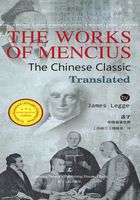
CHAPTER V
1. King Hûi of Liang said, 'There was not in the nation a stronger State than Tsin, as you, venerable Sir, know. But since it descended to me, on the east we have been defeated by Ch'i, and then my eldest son perished; on the west we have lost seven hundred lî of territory to Ch'in; and on the south we have sustained disgrace at the hands of Ch'û. I have brought shame on my departed predecessors, and wish on their account to wipe it away, once for all. What course is to be pursued to accomplish this?'
2. Mencius replied, 'With a territory which is only a hundred lî square, it is possible to attain to the royal dignity.


CHAPTER 5. HOW A RULER MAY BEST TAKE SATISFACTION FOR LESSON WHICH HE HAS SUSTAINED. THAT BENEVOLENT GOVERNMENT WILL RAISE HIM HIGH ABOVE HIS ENEMIES.
1. After the partition of the State of Tsin by the three families of Wei, Châo, and Han (note, chap.i), they were known as the three Tsin, but king Hûi would here seem to appropriate to his own principality the name of the whole State. He does not, however, refer to the strength of Tsin before its partition, but under his two predecessors in the State of Wei. It was in the thirtieth year of his reign, and B.C. 340, that the defeat was received from Ch'i, when his eldest son was taken captive, and afterwards died. That from Ch'in was in the year B.C. 361, when the old capital of the State was taken, and afterwards peace had to be secured by various surrenders of territory. The disgrace from Ch'û was also attended with the loss of territory;—some say seven, some say eight, towns or districts. The nominative to the verbs 败, 丧, and辱 does not appear to be 寡人 so much as 晋. 寡人耻之 may be translated—'I am ashamed of these things', but most commentators make 之 refer to 先人, Hûi's predecessors when Tsin was strong; as in the translation. The same reference they also give to 死者, as not said generally of 'the dead',—those who had died in the various wars. This view is on the whole preferable to the other, and it gives a better antecedent for the 之 in 洒之. 一=by one blow, one great movement. 洒=洗. 比, the 4th tone,=为, 'for'.


3. 'If Your Majesty will indeed dispense a benevolent government to the people, being sparing in the use of punishments and fines, and making the taxes and levies light, so causing that the fields shall be ploughed deep, and the weeding of them be carefully attended to, and that the strong-bodied, during their days of leisure, shall cultivate their filial piety, fraternal respectfulness, sincerity, and truthfulness, serving thereby, at home, their fathers and elder brothers, and,abroad, their elders and superiors,—you will then have a people who can be employed, with sticks which they have prepared, to oppose the strong mail and sharp weapons of the troops of Ch'in and Ch'û.
4. 'The rulers of those States rob their people of their time, so that they cannot plough and weed their fields,in order to support their parents.


2. See Part II. ii. I; but it seems necessary to take the 方 in this and similar cases as in the translation.There is a pause at 地:—'with territory, which is', &c.This is the reply to the king's wish for counsel to wipe away his disgraces. He may not only avenge himself on Ch'I, Ch'in and Ch'û, but he may make himself chief of the whole nation. How, is shown in the next paragraph.
3. 省刑罚, 薄税敛 are the two great elements of benevolent government, out of which grow the other things specified. 刑罚 can hardly be separated. The dictionary says that 刑 is the general name of 罚. If we make a distinction, it must be as in the translation;罚 is the redemption-fine for certain crimes. So 税敛 together represent all taxes. Great differences of opinion obtain as to the signiflcance of the individual terms. Some make 税 to be the proportion of the land-produce paid to the government, and 敛 all other contributions. By some this explanation is just reversed. A third party makes 税 to be the tax of produce, and 敛 the graduated collection thereof.This last view suits the connexion here. 易, read i,the 3rd tone,=治. 壮者,—at 30, a man is said to be 壮.Translators have rendered it here by 'the young', but the meaning is the strong-bodied,—those who could be employed to take the field against the enemy. 可使does not appear to be—'you can make or employ', but to be passive with special reference to the 壮者 above. 省, read shăng. 挞—'to strike',—here= 'to oppose'.
4. 彼, 'they' or 'those', i.e. the rulers of Ch'in and Ch'û. 养, the 4th tone. It is so toned in the case of children supporting their parents, and inferiors their superiors. See in Analects, II. vii.
5. 夫, the 2nd tone, here=则.


Their parents suffer from cold and hunger. Brothers,wives, and children are separated and scattered abroad.
5. 'Those rulers, as it were, drive their people into pit-falls, or drown them. Your Majesty will go to punish them. In such a case, who will oppose your Majesty?
6. 'In accordance with this is the saying,—"The benevolent has no enemy." I beg your Majesty not to doubt what I say.'